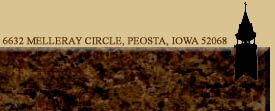|
Mutual Service in Manual Labor |
|
Shared Liturgical Prayer |
|
Meditational Scripture |
|
Prayer in the Heart |
We are now ready to review the practice of lectio divina, i.e., Sacred Reading. We see, now, that this practice is a vital part of Christian spirituality, the reception of the Word sent by the Father for the salvation of the world.
The term and the practice of Sacred Reading can be understood broadly to include besides Sacred Scripture a great variety of books of devotion and spiritual doctrine. We need not deny the legitimacy of this use of the term lectio divina. However, in the present discussion we will limit the meaning of lectio divina to the search for union of mind and heart with God through Sacred Scriptures exclusively.
Lectio Divina: Grace or Technique?
There is a sense in which we could understand the word technique that would apply to lectio divina, the Jesus Prayer, the rosary, or any form of Christian devotion. In this case, technique would merely mean embodiment, and all graces are embodied in the recipient. In this vocabulary, technique is embodied grace or the form grace takes when lived out by a person. We make no exception to calling lectio divina, prayer of the heart, etc., techniques. But when we consider what grace and technique usually mean, we maintain an absolute contrariety between a grace (such as lectio divina or prayer of the heart) and a technique.
A grace is a free action on the part of God. It is not necessary. It proceeds from the Divine Liberty. It is option and choice made on the part of God. A grace is a share in God's own inner life which God decides to offer to one independently of the laws of nature and the behavior of that individual. A technique is a humanly devised plan of action leading to a determined result. It is based on the constancy of the laws of nature and of human behavior. The result attained by a technique is natural and automatic. Whenever the technique, or disciplined action, is properly performed in a controlled environment, the desired result follows inevitably, necessarily. A grace involves the inter-play of divine and human free will, with the initiative on the side of God. A technique is a humanly conceived and initiated exercise of power for the production of a desired effect.
A concrete experience of lectio divina is a grace from God. That is to say it is God's gift to the person. It is indeed the action of the person, perhaps even a person's habitual action. But this action, or repeated action, is, first of all, God's gift. An act of lectio divina, and indeed all good actions, are God's gifts. If these actions rose uniquely from the will and decision of a person, then they could be organized into a methodical system, a technique, a Christian equivalent of Eastern yoga. In that case, the method of lectio divina could be codified in a set formula and reproduced at will, given the required circumstances. It would then be merely human spiritual discipline. But in fact, lectio divina is an experience given by God, if God wills, when God wills, and to whom God wills. There is nothing automatic about it.
Lectio divina cannot be produced by efforts, method, system or discipline. It is not a human technique. When the experience is described in writing, the literary expression is orderly, objective, composed of neatly arranged inter-related parts. The verbal or written account tries to tell something of what can happen in the experience of lectio divina. This entails the unavoidable danger of giving to the reader the impression that these things must happen, as if by some law of necessity. Such an impression, amounting to an implicit Pelagian heresy, is the worst misconstruction. In the matter of lectio divina, as in all Christian asceticism, we have nothing good that we do not receive as a free gift of God. Notice: free gift of God. Not one that can be taken, demanded, or presumed; not one that can be produced by our own efforts or achieved by the discipline of our wills. Effort and discipline are certainly essential to the experience of lectio divina. But they too are God's gifts to us, not our technique for producing anything. We must say the same things about manual labor, liturgy and prayer in the heart. They come-to-be by God's grace in us. They are not our technique for gaining God's grace. Please bear these cautions in mind and do not misconstrue the following accounts of lectio divina and prayer in the heart.
The Experience of Lectio Divina
There is no way to codify the unlimited possibilities of experience of God in God's Scriptural Word. The variety is potentially infinite. What we can say is that Christians in the monastic tradition have used four general categories to tell of their experience of lectio divina. Our special categories: North, East, South and West, give a general indication of direction and yet become less and less exact the further we go in any one of them. It is similar with the four principle categories traditionally used to encompass the experience of lectio divina. We speak of: reading, meditation, prayer, and contemplation as indicating the four principle directions in which we may be led in lectio divina.

 An off-site link
An off-site link An e-mail link
An e-mail link